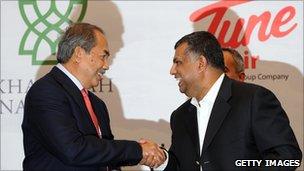Malaysian Airlines and AirAsia scrap share swap deal
- Published

Chief executive of AirAsia Tony Fernandes with Mohammad Nor Yusof chairman of Malaysia Airlines
AirAsia and Malaysian Airline System (MAS) have scrapped their proposed share swap deal amid pressure from the workers' union at MAS.
The deal was expected to reduce competition and help MAS, the national carrier, return to profitability.
However, it had proven unpopular with the union amid concerns that the tie-up may lead to restructuring and job cuts.
Tony Fernandes, chief executive of AirAsia, and his deputy Kamarudin Meranun have both quit the MAS board.
The pact had seen Tune Air, the parent company of AirAsia, exchange 10% of AirAsia shares for 20.5% of MAS stocks with state-owned Khazanah Nasional.
Azman Mokhtar, managing director of Khazanah said: "The cross-holding of shares has become a distraction to management's efforts to turnaround MAS and win stakeholders' support for collaboration."
Shares of both AirAsia and MAS, which had been suspended on Wednesday, rose in early trade on Thursday.
Politically driven?
The move to scrap the deal comes at a time when the popularity of the Malaysian government has been falling.
There has been growing speculation that the Prime Minister Najib Razak may call elections soon.
With a 15,000 strong membership, the MAS union is a big potential source of votes.
Analysts said that, given the situation in the country, the decision may have been driven by political compulsion rather than by business logic.
"The unwinding of the share swap appears to be politically driven. The government doesn't want to alienate any voters ahead of general elections," said Mohamad Amirullah Yaacob, an analyst with Kenanga Research.
'Turbulent times'
While AirAsia has grown robustly to become the biggest low-cost carrier in Asia, MAS has seen its fortunes decline in recent times.
The airline posted a loss of 2.5bn ringgit ($823m; £509m) last year and is forecast to make a loss in the current year as well.
The airline has announced that it will cut more than 10% of its routes in a bid to streamline its operations.
However, analysts said the end of the deal with AirAsia has raised concerns about how the national carrier will be able to turn around its fortunes.
"The issue is how will Malaysia Airlines fix itself," said Ahmad Maghfur Usman, an analyst with OSK Research.
"It is facing turbulent times amid an environment of high jet fuel prices and intensifying competition."
- Published10 August 2011